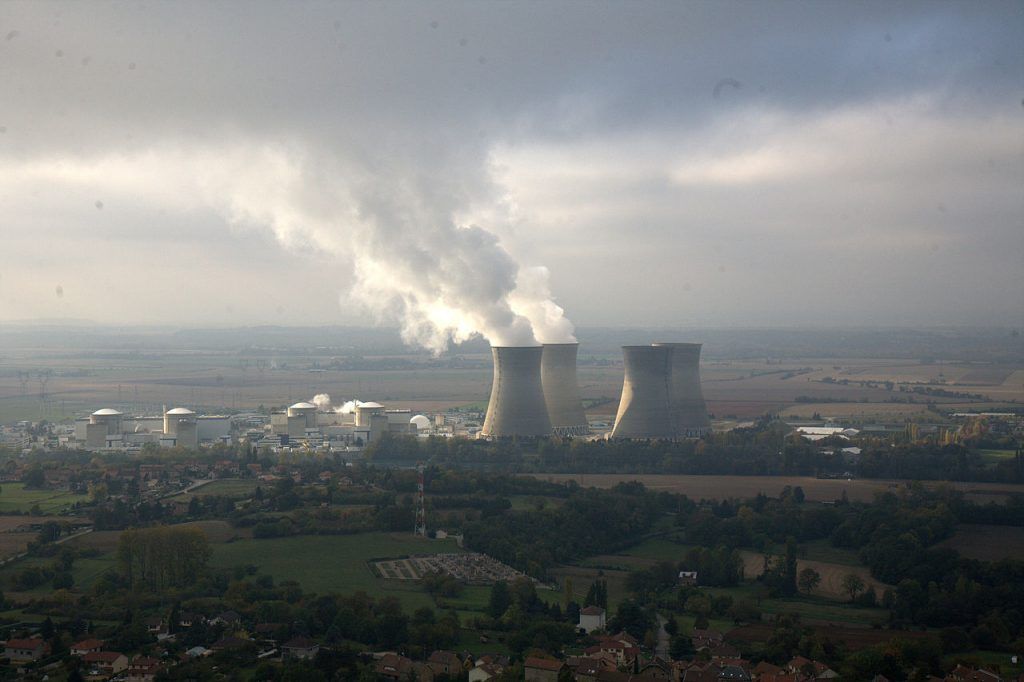Why countries still must prioritize action to curb nuclear terrorism
By Sara Z. Kutchesfahani, Kelsey Davenport | August 3, 2018
 Greenpeace crashed a drone into the spent-fuel cooling building at the EDF-Bugey nuclear power plant site on July 3, 2018 to demonstrate gaps in the facility's security.
Image courtesy of Spiritrespect under Creative Commons License
Greenpeace crashed a drone into the spent-fuel cooling building at the EDF-Bugey nuclear power plant site on July 3, 2018 to demonstrate gaps in the facility's security.
Image courtesy of Spiritrespect under Creative Commons License
When a Superman-shaped drone crashed into a French nuclear plant on July 3 of this year, officials were lucky it was just Greenpeace demonstrating vulnerabilities at the facility, and not a terrorist group intent on attacking the site. This incident highlights why the 2010 Nuclear Posture Review’s assessment that nuclear terrorism is “today’s most immediate and extreme danger” remains relevant: It underscores the importance of the sustained and persistent six-year effort from 2010 to 2016 to reduce the threat posed by nuclear terrorism, far from the headline nuclear issues of Iran, North Korea, and arms control with Russia.
With the future of the nuclear deal with Iran in jeopardy, uncertain prospects for denuclearization of the Korean Peninsula, and arms control treaties with Russia also at stake, the issue of nuclear security may offer a more optimistic future and real opportunities for multilateral collaboration and progress. And as the July 3 incident highlights, the global nuclear security architecture must continue to evolve to address the threat posed by nuclear terrorism.
The Nuclear Security Summits, initiated by President Barack Obama in 2009 and concluded in April 2016, significantly strengthened the global nuclear security architecture and brought high-level political attention to the risk posed by nuclear terrorism. They brought together more than 50 world leaders at four summits—Washington, D.C. (2010); Seoul (2012); The Hague (2014); and Washington, D.C. again (2016)—to consolidate and enhance efforts to reduce the risk of nuclear and radiological terrorism. These were done through strengthening national laws, bolstering international cooperation, and minimizing weapons-usable materials in order to secure nuclear materials and prevent nuclear smuggling globally.
The summits pioneered the use of regular and voluntary nuclear security commitment-making by states and groups of states, leading to the creation of an effective new tool for continuously improving the nuclear security regime. While the summits produced consensus communiques, these documents contained few binding commitments, and were more symbolic than substantive. The bulk of tangible progress came through the innovative commitment-making process, which was encouraged at the first summit by Obama, when he requested that states come to the 2010 meeting with ‘house gifts’—i.e., national commitments to action.
According to a new report from the Arms Control Association and the Fissile Materials Working Group, The Nuclear Security Summits: An Overview of State Actions to Curb Nuclear Terrorism 2010-2016, countries made more than 935 distinct commitments to strengthen and improve nuclear security throughout the six-year process. These voluntary national commitments resulted in some of the most tangible and innovative nuclear security improvements.
Over the course of the summits, at least eight participating states followed through on commitments to eliminate stockpiles of weapons-usable materials. As a result, three entire geographic regions—South America, Southeast Asia, and Central and Eastern Europe—have entirely eliminated highly-enriched uranium from their soil, and only 22 countries possess weapons-usable nuclear material, down from more than 50.
In addition to the critical work to minimize and secure nuclear materials, nearly three dozen states met national commitments to pass new laws or updated existing regulations to strengthen nuclear security. And states created more than 20 new nuclear security centers to enhance training and culture development.
While the summit process significantly strengthened the global nuclear security architecture, the threat posed by nuclear terrorism continues to evolve. Although the probability of a terrorist group building even a crude nuclear device or sabotaging a nuclear power plant is low, the international community cannot afford to be complacent and rest on the successes of the summit process. In today’s increasingly politicized world, nuclear terrorism remains a policy issue in which international political leaders can work together to meet the evolving threat. Global leaders must continue their efforts to mitigate the threat of nuclear terrorism even without the summits.
To meet the ever-evolving threat, leaders must learn from one of the underexplored successes of the summits: national commitments and joint statements, which is where the bulk of the summit accomplishments came from. Moving forward, national commitments and joint statements can still be used as an effective mechanism to curb the nuclear terrorism threat.
Even without the political momentum generated from head-of-state level summits, national and multinational commitment-making could be replicated as part of the ministerial meetings on nuclear security held by the International Atomic Energy Agency every three years. Similar to the national reports issued at the summits, states could also report on the concrete actions taken to advance nuclear security and issue new pledges.
While countries’ national commitments represent significant advances, effective nuclear security requires continuous improvement to address gaps and new threats. States must continue to build on the accomplishments of the summit process to minimize the risk of nuclear terrorism, which they can do through further national commitments and joint statements.
The risk of nuclear terrorism affects every nation. It is a threat that has no respect for borders. Strong nuclear security measures should transcend political squabbles. Thankfully, despite other nuclear policy disputes, the international community largely agrees. That is why all nations should continue to prioritize individual and collective actions that will continue to curb nuclear terrorism.
Together, we make the world safer.
The Bulletin elevates expert voices above the noise. But as an independent nonprofit organization, our operations depend on the support of readers like you. Help us continue to deliver quality journalism that holds leaders accountable. Your support of our work at any level is important. In return, we promise our coverage will be understandable, influential, vigilant, solution-oriented, and fair-minded. Together we can make a difference.
Topics: Analysis, Nuclear Energy, Nuclear Risk, Nuclear Weapons

















All countries are united against any sort of feasible material in wrong hands. It is all collective responsibility to save the human race.
Muhammad Naeem ul Fateh